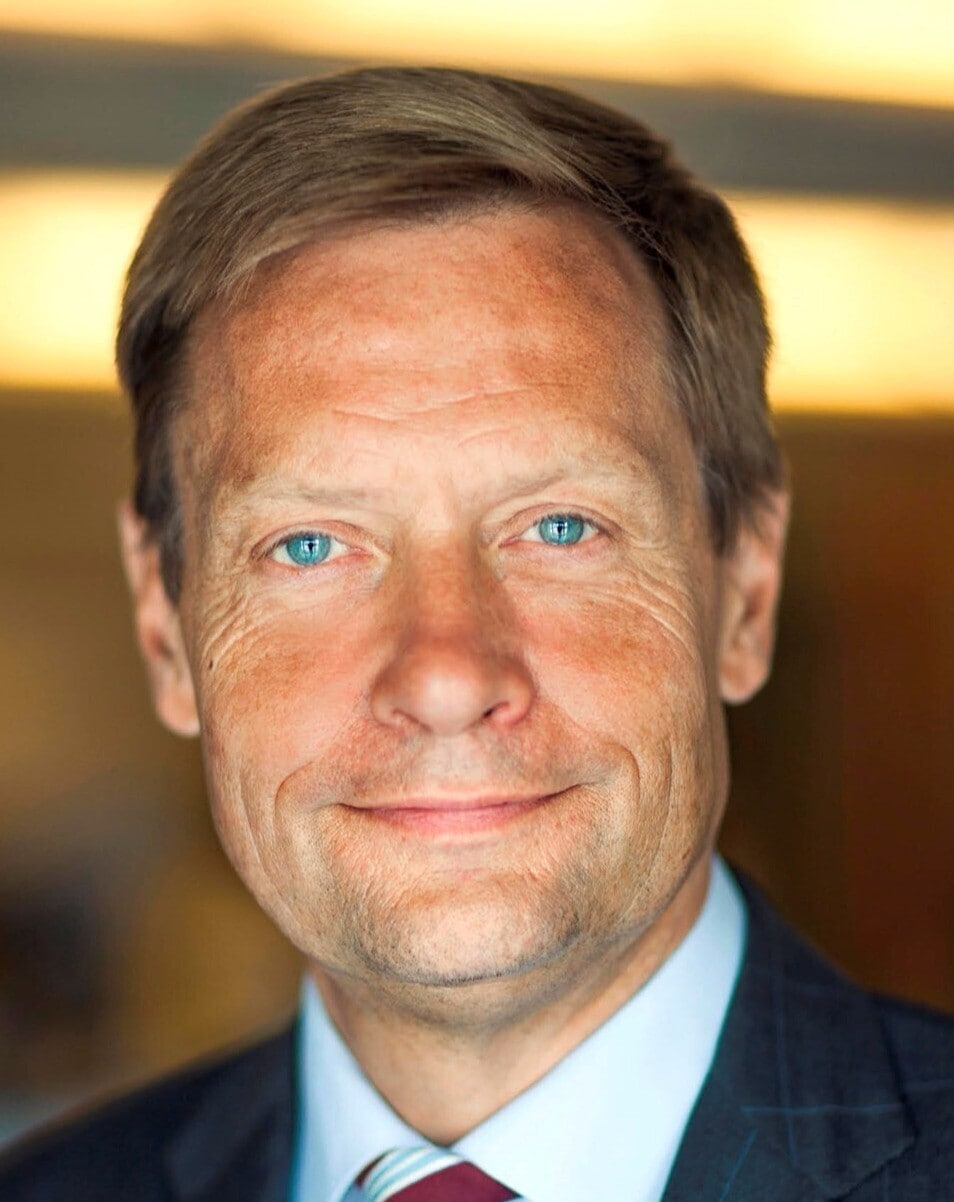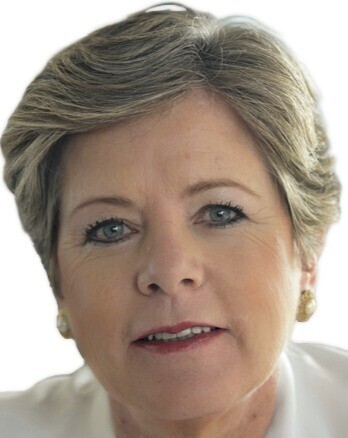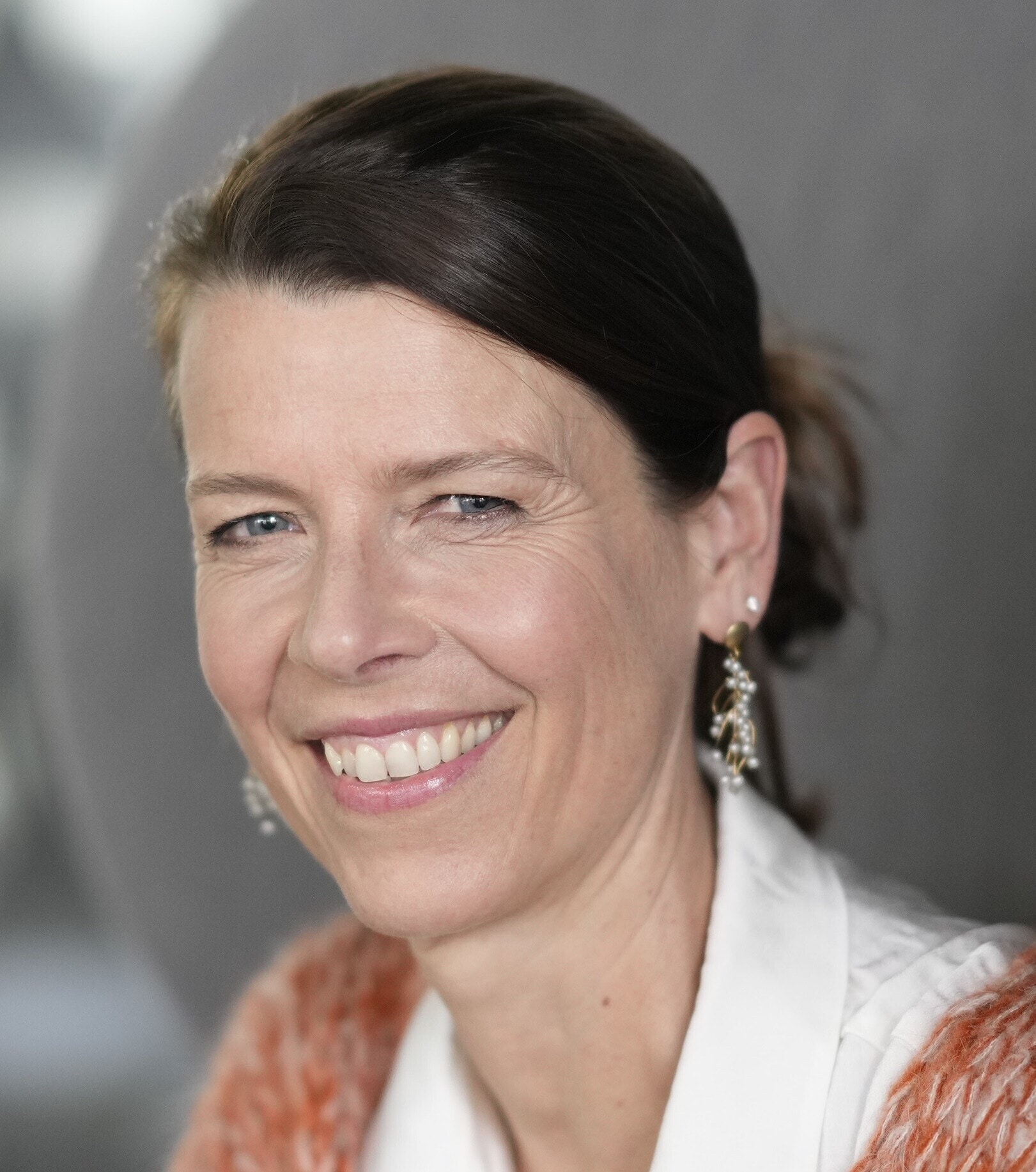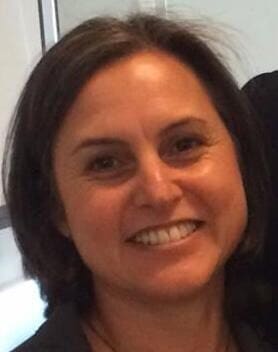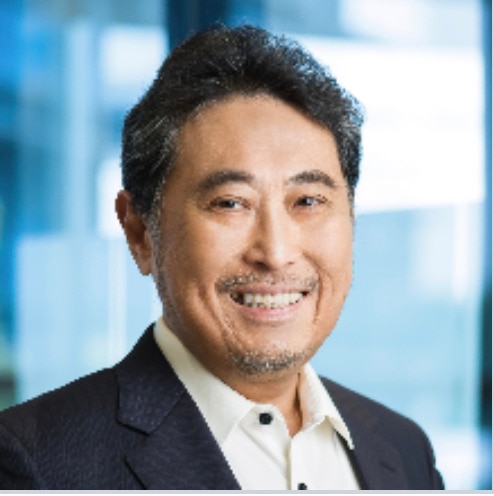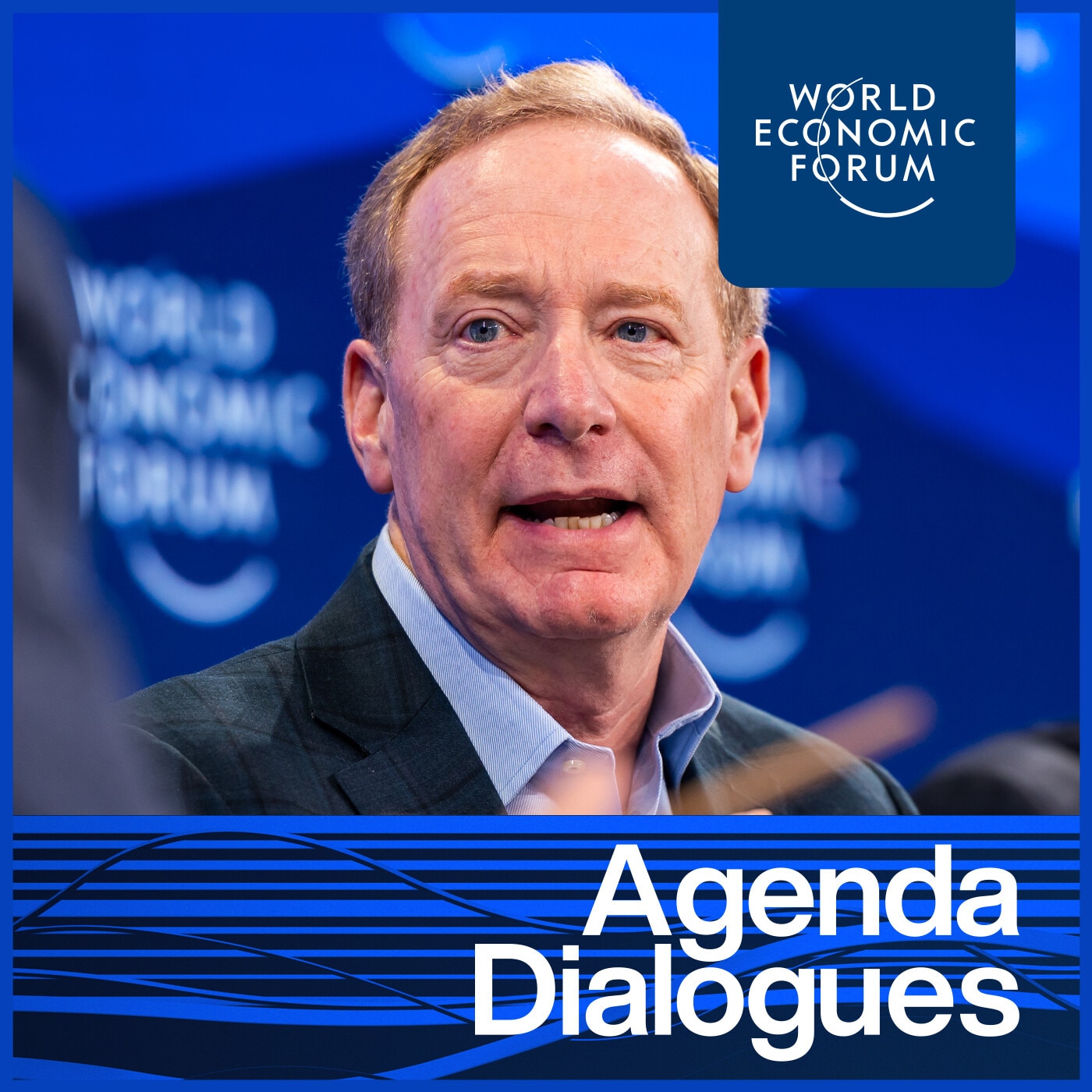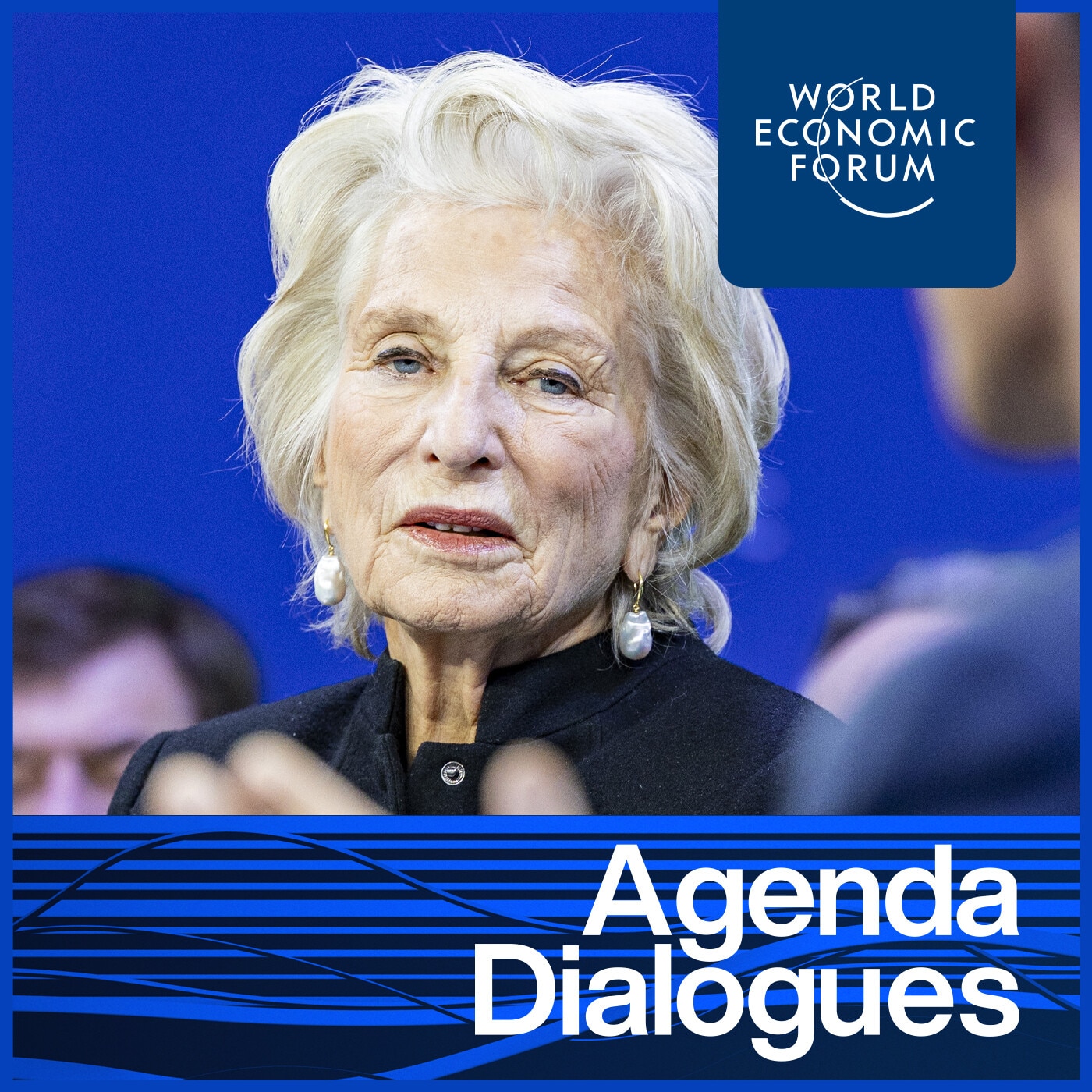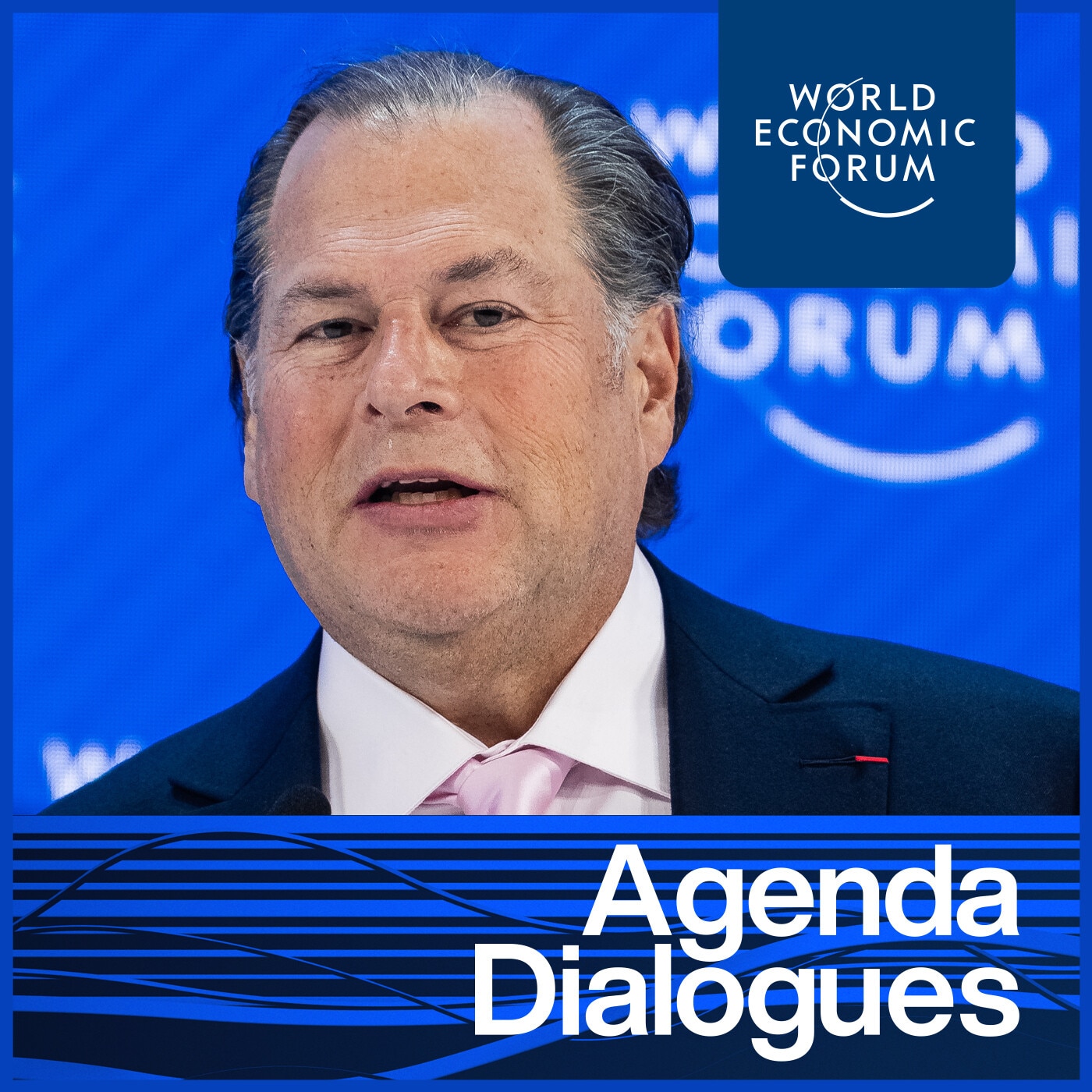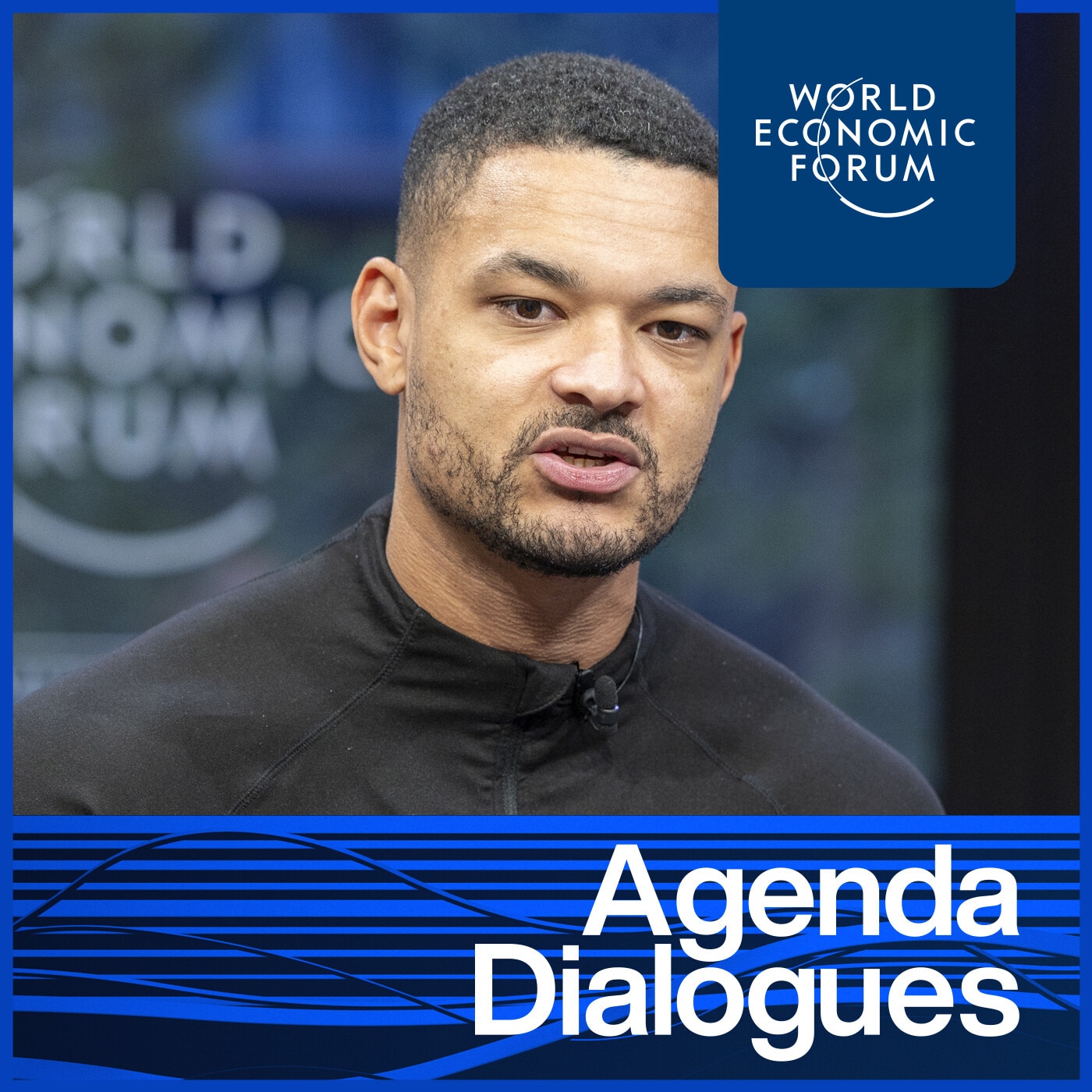Opportunities of the Ocean Economy
播客文字稿
This transcript has been generated using speech recognition software and may contain errors. Please check its accuracy against the audio.
Karen Sack: Good morning everyone and welcome to our session this morning. It's a pleasure to have all of you who are here with us in Davos and of course to welcome those who are joining us from around the world. If I can just remind everyone that this is a public session and it is being live streamed, so please do feel free to post on social media and use the hashtag WEF25. This morning's session is focused on the ocean economy and the opportunities for investment into it. My name is Karen Sack. I'm the executive director of the Ocean Risk and Resilience Action Alliance, which is a unique global alliance of over 100 insurers, banks, multilateral institutions, governments, and civil society organisations. And our focus is on deploying at least $500 million dollars of investment into coastal and ocean resilience through finance and insurance products by 2030, and in so doing. Building the resilience of 250 million climate vulnerable coastal people. Now, before we get started today and I introduce our amazing panel and our guest speaker. I want to just give a little bit of framing about the ocean because oftentimes, even though it is the largest biosphere on Earth, it is host to 80% of all life on Earth. 90% of international trade is carried over the ocean. It has captured 30% of our CO2 emissions and absorbed 90% of the heat from those emissions. So this is an earth system that's absolutely critical but is changing and ocean risk is becoming a bigger issue. But there are huge opportunities as well. Opportunities to invest in the ocean sector, invest in a regenerative and sustainable ocean economy for our common future. And at the WEF and with our organisations more broadly, we talk about the word regenerative ocean economy very specifically, because we need to invest in the economic drivers that are going to build social cohesion, resilience and enable economic growth at the same time. Now this is an especially important time for this session to happen because in June of this year, there will be the third UN Ocean Conference which is being hosted by France and Costa Rica in Nice. And it is immediately preceded by a special event focused on the blue economy and finance which is been hosted by Monaco. And the ocean community as a whole is really looking to that as an opportunity During which we can really kick start a capital market for the ocean and the type of investment that hopefully we will be talking about today So, to begin with, I'm going to ask you to please quickly welcome... Our guest speaker, the Secretary of Environment and Natural Resources for Mexico, Secretary Alicia Barsena, who is a member of President Scheinbaum's cabinet and has served in this role for just a while, but before that was foreign secretary, has worked at the UN in various capacities, and I think maybe most importantly, is a biologist by training. So you bring together the science, the economics, and the policy. Please, can you talk with us today about what Mexico is doing? And of course, I think, just to congratulate Mexico on the new blue bond for $220 billion focused on coastal fisheries and sustainability that was just announced this past December.
Alicia Bárcena Ibarra: Absolutely. Good morning to everyone and it's a pleasure to be here. I don't know if I'm well located here, I suppose so. But anyway, what I want to say is that ocean economy, and actually I want focus precisely on the opportunities for ocean economy for jobs and for economic activities. So first of all, let me tell you what we think in Mexico we have. The ocean economy contributes more or less 2.5 trillion. Dollars annually. So we're talking about big economy behind the oceans. And I mean annually to the global GDP. And it can generate 350 million jobs worldwide. Now in Mexico, and this is what you were saying, we have 62% of Mexico land, or not land, but territory, is marine. And these marine ecosystems are around three million kilometres, square kilometres is what the surface of our marine territory compared to two million square kilometres of terrestrial. So we are more marine than terrestrial because we have islands, we have 24,000 islands in Mexico. 11 kilometres of coastal line. So what do we want to do with this blue bond? Actually we want promote aquaculture and basically to promote riverside fisheries because it's so important. And we're losing a lot of fisheries in many parts of the planet, I have to say. I mean, Mexico is not the exception. And we have two oceans. We have the Gulf of Mexico, hopefully will continue to be the Gulf of Mexico anyway, and we have the Pacific Ocean, what we can call it anyway, but it's the Gulf of Mexico and the Pacific ocean. And that gives us 11,000 kilometres. So we are really a coast country. And what we want to do is to generate one particular ecosystem, which is mangroves. We believe that mangroves are essential. For the carbon sequestration, number one, and also because they are the places where the fisheries reproduce. And this is something that the fisherman and fisherwoman in Mexico have realised more and more every day. So we are going to restore. We have a national plan of restoration of mangroves with this money. We're going to do a lot with that. And of course, this is going to recuperate, restore aquaculture indeed. The second thing is tourism. We feel that, I mean, Mexico is a touristic area, but we want to do it together with the ocean and on against the ocean, which is more or less the... The more or less the things we have done in the past. And one of the threats we have in the Caribbean coast is sargassum. As you know, sargessum has become a very big problem. So now what we're doing with sargussum, first of all, we are treating sargossum as a fishery. We have to fish it in the sea, not after they have come already to the beach, because it gets toxic there. So we are going to open up a circular economy park in Quintana Roo to treat and to make a treatment to the sargassum. We have companies that are interested in this and we're going to produce cosmetics and substitutes of plastics which is another of the main threats in the oceans today. So sargasum is an opportunity we're to invest in that circular economy. We believe then that can bring circular economy, tourism, fisheries, but we need to invest and that's why we put together this blue bond and I think it's one of, I think in the world we only have seven bonds, blue bonds, and this is one of them. So I hope that many other economies are going to join us to be able to have this type of financial instruments because we need to support the local communities that live in the coastal area. Now The main problem we have in Mexico and I think in many parts of the world is that we are competing with industry and basically with the oil industry. So that's something that we need to put together because we do have some conflicts there in the Gulf of California that at some point you know that Cousteau mentioned that the Gulf of Californa is the aquarium of the World which I think it is and so we need to protect that area quite a lot from other projects that can. Really bring some conflict. So thank you so much for your attention. Let me tell you that I think ocean economy is a great opportunity for the world today. Thank you so
Karen Sack: Thank you so much for what an amazing way to start off this conversation because there truly is an ocean of investment opportunities. What the secretary has described to us is where those opportunities are. And maybe what we could look at is some offshore renewables to combine into that mix as we move forward. And I know that Thomas will talk a little bit about that as we turn to our panel this morning and let me very briefly introduce them. We have Barbara Karuth-Zelle, who is the Group Chief Operating Officer and member of the Board of Management of Allianz. We have Thomas Thune Anderson, who is the chairman of Lloyd's Register Foundation. And Fred Chavalit Tsao, who's the chair of the Tsao Pao Chee, or TPC group. And I hope I didn't do a terrible job on the pronunciation of any of those. My apologies if I did. TPC is a Singaporean shipping company. And as we turn to our panel, what was really interesting, We did some research, and I'm just reflecting on the Secretary's comments, we did some research last year, which indicated that per annum, in six regenerative and sustainable blue economy sectors, there is about $550 billion of potential investment between now and 2030. So, Barbara, I'm going to turn to you. Allianz is, I actually looked this up this morning, the largest insurance company in the world. You are focused on product development, on investments, and obviously on your internal operations as well. So as you look at this issue of an ocean that is changing, emerging ocean risk and vulnerability, vulnerabilities, exposures and hazards, which are the key words, the three key words for the insurance sector, where do you see those risks emerging? And I'll see you next time. Where do you see the opportunities for moving forward in the sector?
Barbara Karuth-Zelle: Yeah, thanks. Thanks, Kevin. Thanks for being here. And also thanks, Secretary, for this very interesting speech. I've been to Mexico. It's a fantastic underwater world which we absolutely need to protect, not only there. So the ocean, besides being beautiful, is a huge economy. And if we were to put together the world's ocean, it would be, we can look at the numbers, the seventh or the eighth largest economy. So there is a lot that we get from the ocean. There is food, there is energy, there is global trade infrastructure and there is tourism. There's a lot of leisure, there is marine technology, biology, you name it. But if the ocean actually deteriorates, as we see now, it poses an immense risk to everything besides the personal tragedies that we see with the impacts from the floods, from the storms. You know, with the heating, then we have the social inequity, because we see that the local communities are really suffering. So there's absolutely a need to act. And as an insurer, we have a variety of opportunities, of course, what we can do, because first, but let's even start before, because I think we can agree that we reached planet boundaries, and I think this is a fact. And then there's something that comes before even insurance. This is that we need to invest in resilient infrastructure. And in resilient, infrastructure, I'd also call it, included everything that is in the sea, that is the coral reefs, that have you, that is among grove reforestation. But then of course there comes insurance investment into the game. And then these three areas that we have. The first one is everything like insurance business, that is pricing underwriting, really consulting, advising where to build, how to build what to do. Also walking away from business that is putting the ocean at risk and it was the big discussion last year on seabed mining. And we also actually will not sign anything on seawed mining because the risk is just completely unclear. Then is the second area for us of course big and this is like the investment area. And there's much more that we can do, there's like conservation funds, there is blue bonds, this is really something we need to look into. Here I would really have like an ask for the community, because we need, to make that more visible. You know, at the moment this discussion looks like more discussion under friends of the ocean, because we like the ocean but it's not. Because the impact is really huge. And if we look like our economists, they did a research, taken a lot of data, is a yearly 150 million funding that we need to do all that in the area of fishing, in the era of restoration. We have 125 billion funding gap. So it is something that absolutely we need do. The effect is clear for insurance because what do we get out of it? Is if we actually do the reforestation of the mangrove, the coral reef, we can really limit the impact on the nut cut, we really protect people's health, we protect property, we can protect people business that is really under heavy attack and we will hear from my distinguished colleagues here. And then the last one of course what we also need to do, our own operations and there we started early to already start with a couple of tactical moves. Because of course, we know that climate change is the biggest risk, but I would actually not let go the pollution and I would not let illegal fishing and all of that. So this is why we partner and we partner with three companies for the moment. We partner with Sea Shepherd, we partner Enalaya and Plastic Fisher, while Sea Shepherd is on the illegal fishing side, Gold's Net and what have you, then Enalay is really educating even the fishermen to bring back what they find in the sea that does not belong to the sea. They do the circular economy because then they produce out of what they found. They produce new goods, they produce furniture, they produce like sporting goods, kayaks and what-have-you. And then last but not least, we have Plastic Fischer and they're taking out with like this plastic, this... Trash booms that they have, they actually prevent the plastic from going from the river into the ocean and they do a fantastic job. So this is more on a tactical side, but there's so many things that we can do. I just think we really need to join forces, the public, the private sector, everybody who really wants to make a change, because we need to act now and we need to do. We need to stop to talk while talking so it's good, but we need to do this.
Karen Sack: Yeah, and I think that's absolutely the mantra, I think, coming out of here, is we need to continue to talk, but we absolutely have to do. I was in the Maldives last week, and with a group of coral scientists. And as you said, hitting those planetary boundaries and tipping points, they are estimating we've got five years of action in us now, if we want to. Help regenerate coral reefs. That's what we've got to do. So I think from our perspective it's looking at that action focus and I think it's really impressive to see that Allianz, We've got other finance and insurance actors as well that are not... That are looking to not invest in destructive activities like seabed mining and investing instead in ocean resilience. In fact, Mexico was one of the first places where there was a parametric insurance measure developed for your coral reef, which has now expanded all along the Mesoamerican reef and has hopped over into the Pacific as well as a way of investing in communities, investing in reef resilience and helping to drive change. And Thomas, that kind of brings me to you, because as we see these real business opportunities that combine the kind of the social and environmental outputs as well. So yes, there's profit in many of them, but there are social and environment deliverables as well Working with Lloyds Register Foundation and your experience over decades of working in the renewable energy space, where do you see the most exciting opportunities for investment in a regenerative ocean economy?
Thomas Thune Andersen: And I certainly think there are a lot of opportunities. I think just to kind of frame it, a few years ago when we talked about oceans, it was always a subcomponent to all other kind of agendas. So I think what I find is quite encouraging is that the ocean is now becoming a theme in its own right, and some of the other things are below. So it's a little bit of a mindset change where maybe a few year back we were approaching the oceans about thinking about what it is that I or my business can take from the ocean. We are now, and I think we have to be in a position where we have think about what is it that the ocean can afford to give us. So we have start the discussion somewhere else because ideally, the best thing we could do was just to leave the oceans to themselves. But that's not practical because we need to find the balance and therein lies also the question about... Some of the business opportunities. And I think when you look at the business opportunities, we have for centuries, the ocean have been used for things like shipping, for fishing, et cetera. And there's a lot of things we can do better. And that in itself is a discussion about how do we do those things better with a smaller footprint? And or is there a new technology, new business and so on around doing these things? The maritime industry is a different ways of. Designing vessels, different fuels and all those kinds of things. So there's a lot of opportunities there. But it is about now starting to work and think outside the silos. And one of the examples, of course, is the offshore wind farms, which is a fairly new industry. So it's something that is only still building out and so forth. And there, in my opinion, it is a natural ask for those who then are allowed to make an offshore wind farm. That they have to do something in addition, not only put up the wind farm. And that is something that both authorities can put on as a task, but also something that the companies in their own DNA ought to think that that is really what we want to do. Because that is very good for nature, it's good for the social impact, and it is good for your own employees because they feel a belonging to something that is a And there, again, you can have lots of things. You can have fish farming in between, or you can plant sea grass, or you could decide to do absolutely nothing and leave it to regenerate in its own right. For me, an important thing that I kind of learned yesterday in one of the sessions was... That there's more of an ability to improve things faster than I maybe thought. We had a presentation about planting a seagrass. We had presentation about how to regenerate coral reefs where people were having an optimism that I didn't really initially have myself about the time it takes. And I think it's very important that we communicate that out in business because I think maybe too many of us are maybe close to giving up. And understanding that there is actually a lot of things that can be done, because we are in a situation now where I think there is a much higher awareness of the issue. The oceans is now top of the debate in many places, and with that comes many, many business opportunities.
Karen Sack: And I always like to think of the ocean as like the most incredible entrepreneur that has been innovating for millennia and has this incredible ability to regenerate if we let it. And as you said, the most important thing is really protecting large areas of the ocean, so it can regenerate, it can become more of a carbon sink, there can kind of be these fish banks that grow and because they know walls around marine protected areas, they can flow into the areas around that and replenish those. And it's about us working with nature and investing in nature. And so from the perspective of philanthropy. Thinking about how to complement some of the things that Barbara was talking about in those investments. If we can just stay with you for a moment and think about the role of philanthropy in sparking the type of investment we need to see in the social economy.
Thomas Thune Andersen: I think there's so much more where we can actually look at philanthropy as a natural part of private public philanthropy. But it's a little bit about where do you see your risk. And I think philanthropy can think about the risk appetite in a different way. Because if we are in a situation where we're having a business and the business case and we are close to an FID, a final investment decision, a lot of people will finance But it is, you know, at an earlier stage when it's slightly more experimental, where you need to get something up and running, and you need to reach out. That's where philanthropy, I think, can have a role. But philanthropy needs to understand that they might invest in something which is a failure, but that can be a success. Because they need to take a risk at an early stage, get involved, and maybe in So find out that this particular thing didn't really work as well as we thought it would do, and then move to something else. Because that is in the heart of philanthropy, is to kind of become wiser, share the knowledge, and create a better platform. But there is an angle here that I think is important, and I will put it in here. It's slightly on the side, but one of the things that we as a foundation has been looking very much at, of course, is not only the human impact. But actually looking at diversity and gender, et cetera, in the ocean, not in the oceans, but in the work around oceans, where there is kind of a very big distortion in the numbers, but to really try and promote how a lot of the things we look at in oceans are actually also opening up for different kinds of jobs, different diversity, and with that, a different mindset that might even further facilitate the understanding of oceans.
Karen Sack: Yeah, it's so interesting, you know, this is really about working from beachfront to boardroom. And we at Aura have a grant making facility, and we invest small grants into the development of finance and insurance products in the global south. And they all have to be nature positive, climate positive and gender positive, and be locally led. We've got 50 products now in our pipeline over just the last three years or so. None of them have failed, which is amazing, but that philanthropic kind of sense of if they do fail, that's okay, because what that teaches us is what doesn't work. And when they're successful, they can replicate and scale around the world, which is what's really exciting. And so thinking about how to work with those smaller medium-sized enterprises and social enterprises on the ground, and then Fred, all the way to the boardrooms, you're a family-owned business, tell us how a business like yours can lead in this space and use innovation really to break the mould so that we can drive the acceleration of investment into a regenerative ocean economy.
Chavalit Frederick Tsao: Well, first of all, there's a very big system. We talk about a holistic approach and a systemic understanding and a systematic intervention. So first, we have to understand that the whole system needs to evolve against the human challenge of sustainability and human wish to have a new paradigm of well-being and happiness. They're United Nations talking. So where's an alignment there? And so the whole will reposition. When the whole system position, there's a process of deconstruction and there's process of construction. These two all gives opportunity if you see how the system is balancing in the whole picture. That's when coming to WEF and this gathering or these ocean summit is where you can explore and see a bigger picture and build awareness. So for us, for example, we talk about philanthropy, traditional family business has a philanthropy side from the family office. But now we see more and more the trend of business being philanthropy, like Lloyd's. But for us, we have a much more integrated approach. We have three philanthropies in the corporate besides the family philanthropy. One is environment, restore nature, addressing both rainforest issue and mangroves and other issues. And then we have another called Octave Institute that look at individual and social transformation and organisation development. That is an environmental and social initiative that our executive must participate to integrate within the business. These are just different structure to deliver the result of business. And number 17, which is our main coordinating partnership, because it has to go through co-creation. Now there's one big issue in the different supply chain, because while we're building a wellbeing supply chain we're repositioning our industrial supply chain. And we found out, because many years ago, when we were fighting substandard shipping and safety issue more than two decades ago, I chair International Shipping Association, work in IMO, and also get the different component in maritime, like shipbuilders and class, to really accumulate and talk. That's a very slow process. And I think here, while we are moving into building awareness, the industry must integrate themselves. Fishery or farming or even plastic issues, a maritime of shipping and the classic thing I see also for example is moving into circular economy like our shipyards are now recycling offshore facility and then we're now studying and sending the shipyard into scrapping of ships. Every unit must do, they need to share and find a way, but we need to get the industry to drive this initiative together with government and together with philanthropy. And to interface with philanthropy, business like ourselves set up philanthropic units so that they can work with them. So therefore, I think the next step is the work of industry like ourselves to get organised.
Karen Sack: Yeah, so interesting, you know, I was listening to a talk by Muhammad Yunus yesterday and he was talking, he was actually comparing the shift to net zero or zero carbon emissions to stopping smoking. He said, the more of an addict, you know, if you're smoking 40 cigarettes a day, you might need to slow that down over a period of time, but if it's just one or two cigarettes a day you can stop smoking more quickly. Well, in the analogy, we are smoking 40 cigarette a day in terms of the harm that we are doing to the ocean, and so we've really got to move quickly and think about how we can make those shifts across business sectors. Secretary, I'm going to give you a slight warning that I might, if you're interested in responding to any of this, come back to you in just a second. But I wanted to think... Back then to, we've heard about mangroves and literally the quadruple bottom line that mangrove provide in terms of their resilience value, their nurseries for baby fish and other species, the toxins that they philtre out from land before it gets into the sea, and then their carbon sequestration value. And I'm wondering, Barbara, as we look at some of the financial products that can be developed, some of the investments that can be made that are nature positive. If there's anything in terms of work that you've done on land that could be applied to the ocean space or something that for you is really exciting in this space at the moment.
Barbara Karuth-Zelle: Yeah, absolutely. So we already do that on land in various regions and we have very good benefits there. And we actually want to tap now into the same on the sea. And there's a lot of opportunities as we already have heard. What I would like to come back, what for me is even more important now, because I think there is a lot data already, but we need even more. Really, we need to have the data because. The people invest when they see the impact, the benefits, and that is not yet crystal clear. So I know there's a lot of effort that is going into that, but why not combining? Also, while we do this cross-collaboration, we need to combine also with the tech people, because they sit on all the technology that can help us to look into this huge amount of unstructured data that we need, because we need take informed decisions, business decisions based on data. And I think this is a big opportunity. I think, this community, what I said before, needs to open up more and understand where we could get help. To actually increase the awareness, because we are clear and we know what to do. It's just simply to get more data, to get the people aware, to make them understand what is under the blue surface, because if what is happening under the surface would happen... Outside, what happened here, everybody would start screaming, but since you don't see it, because the water usually is blue, sometimes it's a little bit different, the colour of course, but that's it. So I think I would rather go there, I would really ask for data, I would ask to reach out to the tech experts to understand how we can combine that and then really start creating a huge awareness campaign.
Karen Sack: It's interesting, working with our partners AXA, the University of California, Santa Cruz, and IHE Delft, we developed a coastal risk index, which looks at coral reefs and mangroves and their kind of resilience value. And it estimates that per annum, $363 billion worth of assets could be at risk as a result of a changing ocean. As we've talked about there are these huge opportunities to reduce that kind of risk and there was some research done by the WWF several years ago which showed that there is a huge turnaround opportunity to reduce the risk exposure from about $8.4 trillion to about $3 trillion if we invest in some of these sectors and I think innovation and technology is so important. But so too... Secretary, is the role of government in all of this and enabling the space. We've got Peter Thompson, the UN Special Envoy for the Ocean, sitting with us. And I know burning question at the front of mind for him is the UN Ocean Conference in June and how we can activate governments to ratify the new high seas treaty, to the global biodiversity framework to protect at least 30% of the ocean. And to deliver the financing that is needed to invest into these spaces. So I'm not gonna put all of that on your shoulders, but having listened to this discussion and thinking about Peter sitting on your shoulder with those issues, any thoughts that you can share with all of us.
Alicia Bárcena Ibarra: Absolutely, and I'm very happy that Peter is with us because I was also in the UN for a long time. In fact, I was in charge of the, long time ago, Agenda 21, it was a different, and I was charge of Chapter 17, which was about the marine and the oceans. And it was the stem of small island development states and so forth. But you know the thing is the following, philanthropy. What happened is that oceans were seeing us. Philanthropic activities, not anymore. And this is where we have to make the paradigm shift and look at the oceans as an alternative for food security because the next chapter in life is gonna be food. And food from the oceans is going to be very important. So we need to protect the oceans. Now, we also need to leave some space for them to restore themselves. Who said that? I think you said that, and you said it. Let's leave it to regenerate itself. And that's why we are committed to this goal of 30% towards 2030. For example, in Mexico, we are already protecting 22% of the marine areas. We have to achieve 30%, and we will. Because really, we need to leave it to regenerate. And we have to leave the oceans to regenerates itself. Mangroves, we have here a magnificent picture of the red mangroves. And we need to make fishermen understand the importance of mangrove because they didn't understand it, honestly. They were chopping them out to produce wood. Now they understand that these are the places where the fisheries reproduce. And the most important ones. So we have to put value to the oceans. And coming to insurance, let me tell you the bad practise in Mexico we had with Acapulco. Acapullco was a disaster that we had Otis, we had the Hurricane John, and it was almost destroyed. Why? Because we didn't have mangroves to protect, because the coastal area was full of hotels. We didn't had really resilient. Now we are understanding that that place, which is so emblematic, so symbolic for Mexico, has to be restored, but differently, totally differently. And there is a commitment from the government to restore it. In every front, fisheries, tourism, ta-da-da too. To sort of make a model out of the restoration of a place that has been so emblematic. So we have to put price, but insurance was a problem because many of these hotels and infrastructure was not insured. So we need to make sure that we place importance in the infrastructure, in the marine protection, and I think we need leave space for regeneration. And of course we're going to be in the ocean conference, my dear Peter. And we are going to put all the interest of Mexico, but we need to involve the finance ministers. Why? Because if we are gonna put bonds and if we're going to engage in insurance and we're gonna engage investment, we need bring these people around, finance and business, I guess. Thank you.
Karen Sack: I think that sums up a lot of this discussion. It's really about blending the types of investments that are happening so that, as Thomas Yu was saying, we're looking at... Offshore renewable and the potential for 40 times more offshore renewable energy by 2050 with sustainable aquaculture and protected areas. How are we thinking about financial products that can help build resilience for communities, and it would be amazing to see an insurance product which actually invests into mangroves or reduces the rise in a premium because a resort has invested in a mangrove. And I'm going to come to you in a second, Barbara, and then thinking about the shipping sector and innovation and, you know, anti-fouling, which can reduce the use of fuel for ships, can be done in a sustainable way. That is part of the ocean economy. I'm gonna turn to you, Barbara quickly, and we'll probably have time for about one question. We might not have time any questions, and so then we'll wrap up a little bit. But bugger.
Barbara Karuth-Zelle: No, I just want to call out for another exchange because I completely agree with the secretary. So what I said before, we really need to have the resilient infrastructure. This is important for us as insurers, but here we can contribute also with a lot of data to build better. I think that is one point that we also absolutely need to look in to actually work together in this field to make that really also insurable. And on this also, I think data will help. And then in addition, we can also predict better because now we are actually having a lot of like climate assessment tools, climate impact assessment tools that we can work together. We can say about this region, this is likely what will be happening. And then we can always do prevention and prediction which also we as an insurer like much more. We like much prevention than cure.
Karen Sack: Right, so better data, better decisions, better outcomes. And I think that is, yes.
Thomas Thune Andersen: I just want to follow, just following up also on the collaboration and also what Frank was saying about the industry that needs to work together. And I just wanted just to call out that in doing so, we need some for us to try and bring people together. And there, as the Lloyd's Foundation, we are very proud to have gone into a working alliance with the World Economic Forum focusing in on ports and is also trying to bring and how do you do nature positive ports? But of course that will spread itself out to all the industry and the maritime things there. So it's also about creating the for-us where we can sit together and talk about it so we can drive things forward from a business point of view.
Karen Sack: Absolutely. Fred, last thoughts from you?
Chavalit Frederick Tsao: Yeah, I think that on one thing, all these issues, I think the industry is sorting out, the industry has to get together. But there are also different roles for money to come in. So industry like ourselves are finding solution. If we want to farm that we need to preserve it. It's a complex thing, restoration. It deals with indigenous tribe. It talks about ESG village is a complex thing that not everybody wants to get in. Some will get in like ourselves with our nonprofit. However, you think about the money What we can play in the industry is the best creating a business model that's viable, but then how do you make it derisk an asset class where the money can flow through? That's another player in the economic side that we can work with them, with industry, to create money going in most effectively and creating the money to go to the acupuncture point.
Karen Sack: And that's such a good note as we kind of close up. You know, yesterday, Standard Chartered Bank announced that they were joining the Back Blue Ocean Finance Commitment, which is an initiative that AURA and the World Economic Forum is working on to engage the finance and insurance sectors towards the blue economy and finance forum. We're gonna recognise Alfredo Giron, who is leading the WEF's ocean work. And the three pillars of the work here on Oceans at the WEF focus on accelerating the just transition, catalysing an innovation ecosystem, and securing the conservation and restoration of natural capital. And I think this discussion today really embodies that. How do we engage the business sector with conservation, translate across the different sectors that we're working with, think about how we can activate different pools of capital from de-risking with philanthropy and the public sector to active investments that are profit driven by the private sector, but that account for social and environmental realities. Thank you all so much for joining us today. We very much look forward to continuing this conversation.
The ocean economy contributes over $2.5 trillion to global GDP annually and supports nearly 350 million jobs worldwide.
How can key ocean-reliant sectors like shipping, ports, food, energy and tourism drive a regenerative ocean economy that balances economic growth, social prosperity and marine conservation?
Find out more about the work of the Ocean Action Agenda, accelerating ambitious solutions for a sustainable ocean economy.
This is the full audio from a session at the Annual Meeting 2025 in Davos.
Guests:
分享:
更多集:
每周 议程
每周为您呈现推动全球议程的紧要问题(英文)
